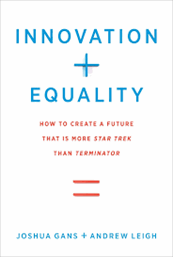- Innovation
Innovation + Equality
How to create a future that is more Star Trek than Terminator
From the industrial revolution to today’s knowledge revolution, the exploiters of technological innovation have created great value for consumers and society while at the same time acquiring great personal wealth. The free market economy and the innovation it nurtures, while driving up living standards and helping reduce world poverty, has also led to significant economic inequality.
Now, in our time of rapid technological advance, of artificial intelligence and biogenetics, there is an increased sense that the levels of inequality are growing too fast and the benefits of transformative innovation are not being fairly distributed. This in turn is creating divisions in society and leading some to claim inequality is the inevitable consequence of innovation.

In 'Innovation + Equality: How to create a future that is more Star Trek than Terminator' Rotman professor Joshua Gans and politician/economist Andrew Leigh debunk this claim and show that fostering innovation and reducing inequality are compatible aims. They argue that by encouraging innovation in the right way we can shape a future for ourselves more like the benign techno-utopia of Star Trek and less like the dark techno-dystopia of the Terminator.
In a 2004 paper Nobel prize winning economist William Nordhaus stated: “We conclude that only a minuscule fraction of the social returns from technological advances over the 1948-2001 period was captured by producers, indicating that most of the benefits of technological change are passed on to consumers rather than captured by producers.”
This may be the case still, but the perception is different and perception counts. Today the top 0.1% of US households controls the same wealth as the bottom 90%, and the fact that the cake is getting bigger does not mean this is not seen to be grossly unfair. An unfairness that is driving the increasingly anti- free-market anti-capitalism rhetoric of the political left on both sides of the Atlantic.
Free market business through its capacity to innovate is well placed to find solutions to the many global challenges faced by society – albeit in collaboration with governments. And it is important that resentment, due to economic inequality, does not undermine this capacity. In this context, the value of Gans and Leigh’s new book is that it offers practical ways for society to have more innovation and more equality and to become both more entrepreneurial and more egalitarian.
The book is not about balancing the benefits and downsides of technologies – how automation will bring convenience but will eliminate certain jobs. Rather, it is about understanding the broader issue of the relationship between innovation and equality. Innovation involves risk and uncertainty. The rewards for taking risks, when successful, can be great for the innovators – and a source to economic inequality. But only ‘when successful’ and we know that at very most only 10% of entrepreneurial innovations are successful.
In a world where uncertainty is a given, risk-taking needs to be encouraged. Gans and Leigh argue there is a better way to do this than merely by rewarding the successful few with pots of gold. They propose a series of strategies for boosting innovation, reducing the barriers to entry for entrepreneurs, and ensuring equal access to future opportunities.
They also stress the importance of developing ‘insurance policies’ for the future – insurance against social, economic, and global shocks – including making sure that there are strong educators teaching in schools and colleges, fair college loan schemes, quality training, a focus on lifelong learning, strengthened workers’ rights, and a workplace culture conducive to entrepreneurship.
“I think our title says it all,” says Gans. “We can have more innovation and more equality. There are no big trade-offs with achieving these two social goals.”
‘Innovation + Equality: How to create a future that is more Star Trek than Terminator’, Joshua Gans and Andrew Leigh. Published by the MIT Press, 2019, ISBN 978-0-262-04322-9
Rotman School of Management is Canada’s leading business school and has Canada’s largest group of management faculty. It is home to some of the most innovative research institutes in the world
ARTICLES YOU MIGHT LIKE
VIEWPOINT
Cognitive neuroscientist, Lynda Shaw, explains how to understand and support intrapreneurs
DEVELOPING LEADERS QUARTERLY MAGAZINE AND WEEKLY BRIEFING EMAILS


































